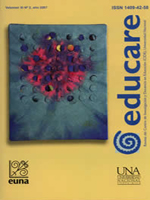Creatividad y desarrollo cognoscitivo (Un enfoque vigotskyano)
DOI:
https://doi.org/10.15359/ree.11-2.5Keywords:
creativity, Vigotsky, Lev Semyónovich, cognitive developmentAbstract
Development of creativity in university classrooms is of great need in present times, when theoretical knowledge is only part of the formation that a future professional must have. University teachers must be aware that creativity can be fomented and stimulated during college education, therefore, it is an important part of his/her role as an educator. In the present work, development of creativity is explained, based on the schemes established by Vigotsky, Lev Semyónovich who has established the foundations for developing these abilities.References
Barquero, R. (2004) Vigotsky y el aprendizaje escolar. (4ta. ed.). Buenos Aires: AIQUE.
Berriozabal, J. M. (1852). El talento bajo todos sus aspectos y relaciones. Madrid: NICOLÁS DE CASTRO Y PALOMINO.
Bono, E. (1994). El pensamiento creativo. Barcelona: PIADÓS IBÉRICA S.A.
Bono, E. (1996). Cultura, educación y desarrollo. Conferencia sobre políticas y educación para la transformación de la educación superior en América Latina y el Caribe. La Habana, Cuba.
Bruner, J. (1966). Toward a theory of instruction. Cambrige, MA: BELKAPP PRESS.
Carretero, M. (1998). Introducción a la psicología cognitiva. Buenos Aires: AIQUE.
Cole, M. (1989). "The Zone of Proximal Development: where culture and cognition create each odder". En Wertsch, J. Voices on the mind. The sociocultural approach to mediated action. Cambridge. Harvard University.
Csikszentrnijaly, M. (1998). Creatividad. México, D.F.: PAIDÓS.
Goñi, A. (2000). Desarrollo de la creatividad. San José, Costa Rica: UNED.
Griffin, P. y Cole, M. (1984). "Current activity for the future: the zo-ped". En Rogoff, B. y J. V. Wertsch ( eds.). Children s Learning in the "Zone of Proximal Development". New Directions for Child Developrnent, núm. 23, JosseyBass, San Francisco.
Guilford, J. P. (1950). "Creativity". American Psychologist, 5, pp. 444-454.
Martínez, L. (1997). Educación y creatividad: algunas tendencias. Conferencia pronunciada en la sesión inaugural del VI Taller Internacional "La educación hacia el siglo XXI", Instituto Pedagógico Latinoamericano y Caribeño (IPLAC).
Maslow, A. (1982). La personalidad creadora. Barcelona: CAÍDOS.
Proyecto Estado de la Nación en Desarrollo Humano Sostenible. (2003). Noveno Informe. San José, Costa Rica.
Rogers, C. (1983). Libertad y creatividad en la educación. Barcelona: PIADÓS.
Zubiria, M. y Zubiria, A. (1994). Operaciones intelectuales y creatividad. Colombia:
FONDO DE PUBLICACIONES BERNARDO HERRERA MERINO.
Published
How to Cite
Issue
Section
License
1. In case the submitted paper is accepted for publication, the author(s) FREELY, COSTLESS, EXCLUSIVELY AND FOR AN INDEFINITE TERM transfer copyrights and patrimonial rights to Universidad Nacional (UNA, Costa Rica). For more details check the Originality Statement and Copyright Transfer Agreement
2. REUTILIZATION RIGHTS: UNA authorizes authors to use, for any purpose (among them selfarchiving or autoarchiving) and to publish in the Internet in any electronic site, the paper´'s final version, both approved and published (post print), as long as it is done with a non commercial purpose, does not generate derivates without previous consentment and recognizes both publisher's name and authorship.
3. The submission and possible publication of the paper in the Educare Electronic Journal is ruled by the Journal’s editorial policies, the institutional rules of Universidad Nacional and the laws of the Republic of Costa Rica. Additionally, any possible difference of opinion or future dispute shall be settled in accordance with the mechanisms of Alternative Dispute Resolution and the Costa Rican Jurisdiction.
4. In all cases, it is understood that the opinions issued are those of the authors and do not necessarily reflect the position and opinion of Educare, CIDE or Universidad Nacional, Costa Rica. It is also understood that, in the exercise of academic freedom, the authors have carried out a rogorous scientific-academic process of research, reflection and argumentation thar lays within the thematic scope of interest of the Journal.
5. The papers published by Educare Electronic Journal use a Creative Commons License:














 The articles published by Educare Electronic Journal can be shared with a Creative Commons License:
The articles published by Educare Electronic Journal can be shared with a Creative Commons License: 



